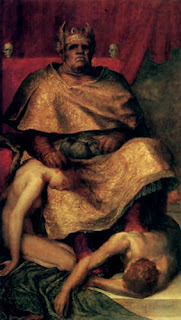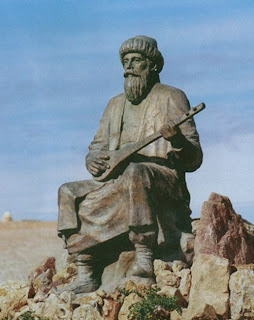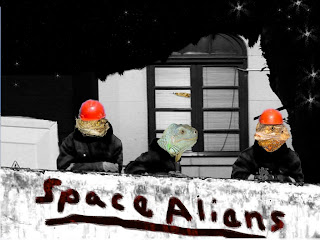
It's that time of year. Ten Best Lists appear in magazines ranging from Artforum to Death Metal Monthly. Like most people, I roll my eyes at the sight of them and then stay glued to the page from beginning to end.
So this year I have decided to jump into the fray and do some lists of my own. This is also my opportunity to completely sell out as a writer and "monetize" my blog. The Monetize tab is prominently featured on the blogger editing page. Several roads to riches are offered, but I have decided to become an Amazon Associate. Therefore you will begin to notice links to books and movies I discuss. In the unlikely event that a reader follows that link and purchases said book or movie, I receive --ok, I will come right out and say it -- 4% of the purchase price. I expect to soon be rolling in the extra coinage. (That, by the way, is Mammon himself to the right.)
I began experimenting some weeks ago, just to see how the process works. I went immediately to my heavily visited posting SOFT CORE NUN PORN AVAILABLE NOW, and made each title discussed into a hyperlink to Amazon. With knowledge gained by my years of retail experience, I even added some new box sets to the posting, thinking that would be a good way to raise the transaction value. Imagine my delight the next day! Although there had been no completed purchases, there were seven click throughs. People were at least looking, assuming those seven were not my own created while checking to see that the links worked.
I am not going to do a Ten Best List proper. Rather I am going to list a few authors I read for the first time this year and suggest why, beyond my personal financial gain, you might consider reading them yourself.
Chris Kraus is an art world denizen who has written three novel/memoir/essays, the first of which has the unsurpassable title I Love Dick (Semiotext(e) / Native Agents) . Kraus is the wife, or by now possibly the ex-wife, of French theorist, publisher, and MIT professor Sylvere Lotringer. I hate to define some one by whom they are married to, but Lotringer is a major character in Kraus's work. In I Love Dick he is not only privy to her feelings for Dick, the west coast social theorist Dick Hedbridge, who's never fully identified in the book but it's pretty easy to figure out, but Lotringer also helps her compose the letters and emails that comprise their for the most part imaginary affair. What I have written so far does not convey just how funny the book is, and I don't know how to convey that aspect -- there are no incidents to describe or clever lines to quote--and so trust me when I say that is very funny. Also at times excruciating, and always precisely and elegantly written.
. Kraus is the wife, or by now possibly the ex-wife, of French theorist, publisher, and MIT professor Sylvere Lotringer. I hate to define some one by whom they are married to, but Lotringer is a major character in Kraus's work. In I Love Dick he is not only privy to her feelings for Dick, the west coast social theorist Dick Hedbridge, who's never fully identified in the book but it's pretty easy to figure out, but Lotringer also helps her compose the letters and emails that comprise their for the most part imaginary affair. What I have written so far does not convey just how funny the book is, and I don't know how to convey that aspect -- there are no incidents to describe or clever lines to quote--and so trust me when I say that is very funny. Also at times excruciating, and always precisely and elegantly written.
Kraus followed up I Love Dick with two more fictional outings, Aliens & Anorexia (Native Agents) (Semiotext(e) / Native Agents) and Torpor (Semiotext(e) / Native Agents)
and Torpor (Semiotext(e) / Native Agents) . Aliens follows her attempts to make a return to the art world as a filmmaker --are you cringing yet? After a very funny opening at a European film festival, the story backtracks to her successfully receiving a grant for travel to New Zealand, her homeland, where she is to make a feature-length, experimental film. For Aliens I can quote a funny line. Cast and crew have been assembled and it is the first day of shooting. Her DP asks Kraus what she has in mind for this scene, and Kraus writes in her book, "I realized that I had never thought of my film in visual terms."
. Aliens follows her attempts to make a return to the art world as a filmmaker --are you cringing yet? After a very funny opening at a European film festival, the story backtracks to her successfully receiving a grant for travel to New Zealand, her homeland, where she is to make a feature-length, experimental film. For Aliens I can quote a funny line. Cast and crew have been assembled and it is the first day of shooting. Her DP asks Kraus what she has in mind for this scene, and Kraus writes in her book, "I realized that I had never thought of my film in visual terms."
Here's a quick summary of Torpor. Kraus and Lotringer decide that a good way to save their marriage will be to take a road trip through post-Soviet Eastern Europe and adopt a Romanian orphan along the way.
Chris Kraus is hard on herself in these books, which gives her permission to be scathing in her descriptions of the contemporary art scene and of the boys' club that is the world of French Post-structualist criticism. But these are presented as novels, and so maybe Sylvere Lotringer is not the total ass he appears to be.
Kraus is my cerebral pick of the year. For the purely visceral, I recommend David Ohle.
In 1972, Ohle published a short science fiction novel titled Motorman . It reads like an Outer Limits episode written by Samuel Beckett. Make that a really good Outer Limits episode with Beckett in a better than average mood. Its hero, Moldenke, inhabits a small apartment in a dystopian future where he receives threatening phone calls from a man named Bunce and knows that any trip outside his apartment is fraught with such dangers as chance encounters with Jellyheads. Jellyheads are pitiful, unpleasant, and dangerous. Reviews were good, sales ok, and it stayed out-of-print for about thirty years.
. It reads like an Outer Limits episode written by Samuel Beckett. Make that a really good Outer Limits episode with Beckett in a better than average mood. Its hero, Moldenke, inhabits a small apartment in a dystopian future where he receives threatening phone calls from a man named Bunce and knows that any trip outside his apartment is fraught with such dangers as chance encounters with Jellyheads. Jellyheads are pitiful, unpleasant, and dangerous. Reviews were good, sales ok, and it stayed out-of-print for about thirty years.
During those thirty years, Ohle taught at the University of Kentucky, Lawrence, where he got to know William Burroughs, Sr. Ohle did some editing and transcribed Queer and a couple more Burrough's novels. Burroughs asked Ohle to take a look at the posthumous manuscript left behind by his son, Billy Burroughs. It was a disaster, but Ohle turned it into the novel/memoir Cursed from Birth (2006).
When Ohle got back around to his own writing, he published in quick succession two sequels to Motorman, The Age of Sinatra (Soft Skull ShortLit) (2004) and The Pisstown Chaos: A Novel
(2004) and The Pisstown Chaos: A Novel (2008). Moldenke remains a character, but what Ohle clearly relishes is concocting the outrageous indignities of his dystopian society. Having to help peddle the streetcars is one thing, but occasionally President Ratt institutes a forced Forgetting, which is only the extreme version of the forced relocations that are commonplaces. Society fights a losing battle against parasitic infections, what food there is is disgusting, and then there are the Stinkers. Stinkers aren't quite dead, live mostly underground, but when they surface they must be cared for. They have some sex angle working as well.
(2008). Moldenke remains a character, but what Ohle clearly relishes is concocting the outrageous indignities of his dystopian society. Having to help peddle the streetcars is one thing, but occasionally President Ratt institutes a forced Forgetting, which is only the extreme version of the forced relocations that are commonplaces. Society fights a losing battle against parasitic infections, what food there is is disgusting, and then there are the Stinkers. Stinkers aren't quite dead, live mostly underground, but when they surface they must be cared for. They have some sex angle working as well.
Ohle's novels are for connoisseurs of all things dire. When you think about it, they are really just about people getting by on getting by, doing whatever it takes -- even if that calls for tending a corral full of Stinkers or handing over a daily stool sample to the government men. They made me chuckle.
To end on a classier note: Norman Lock.
Definitely one of the best writers you've never heard of. He's written eight books and several works for theater. This year I read two novels, and Land of the Snow Men .
.
In Shadowplay, a master of the Javanese shadow puppet theater falls in love with a young woman whom he brings back from the dead by having his puppets act out her story. But don't think this is going to work out well. If you look for Land of the Snowmen on Amazon, you find it written by George Beldon, with Lock credited with the introduction. The bulk of the book is Beldon's increasingly hallucinogenic diary of Scott's famous Antarctic expedition, a diary Beldon composed while institutionalized and which Lock supposedly discovered while recovering from his own nervous breakdown.
The books are brief, perfectly told, totally engaging, and at times heartbreaking. I am wary when I read that someone is "a writer's writer." Often that's code for exquisitely crafted boredom. Lock, I'd say, is "a storyteller's storyteller," an altogether more promising moniker.
Here are some other available titles from these same authors.

















